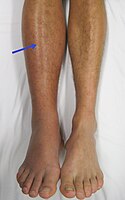
Photo from wikipedia
Background and purpose — Surgical site infection (SSI) is a devastating complication of hip fracture surgery. We studied the contribution of early deep SSI to mortality after hip fracture surgery… Click to show full abstract
Background and purpose — Surgical site infection (SSI) is a devastating complication of hip fracture surgery. We studied the contribution of early deep SSI to mortality after hip fracture surgery and the risk factors for deep SSI with emphasis on the duration of surgery. Patients and methods — 1,709 patients (884 hemiarthroplasties, 825 sliding hip screws), operated from 2012 to 2015 at a single center were included. Data were obtained from the Norwegian Hip Fracture Register, the electronic hospital records, the Norwegian Surveillance System for Antibiotic Use and Hospital-Acquired Infections, and the Central Population Register. Results — The rate of early (≤ 30 days) deep SSI was 2.2% (38/1,709). Additionally, for hemiarthroplasties 7 delayed (> 30 days, ≤ 1 year) deep SSIs were reported. In patients with early deep SSI 90-day mortality tripled (42% vs. 14%, p < 0.001) and 1-year mortality doubled (55% vs. 24%, p < 0.001). In multivariable analysis, early deep SSI was an independent risk factor for mortality (RR 2.4 for 90-day mortality, 1.8 for 1-year mortality, p < 0.001). In univariable analysis, significant risk factors for early and delayed deep SSI were cognitive impairment, an intraoperative complication, and increasing duration of surgery. However, in the multivariable analysis, duration of surgery was no longer a significant risk factor. Interpretation — Early deep SSI is an independent risk factor for 90-day and 1-year mortality after hip fracture surgery. After controlling for observed confounding, the association between duration of surgery and early and delayed deep SSI was not statistically significant.
Journal Title: Acta Orthopaedica
Year Published: 2020
Link to full text (if available)
Share on Social Media: Sign Up to like & get
recommendations!